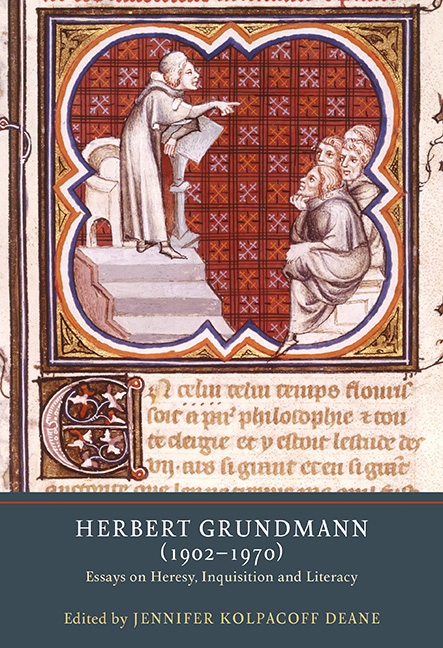Book contents
- Frontmatter
- Contents
- Acknowledgements
- Abbreviations
- Introduction
- Note on the Text
- 1 The Profile (Typus) of the Heretic in Medieval Perception
- 2 Women and Literature in the Middle Ages: A Contribution on the Origins of Vernacular Writing
- 3 Litteratus–Illitteratus: The Transformation of an Educational Standard from Antiquity to the Middle Ages
- 4 Heresy Interrogations in the Late Middle Ages as a Source-Critical Problem
- 5 Oportet et Haereses Esse: The Problem of Heresy in the Mirror of Medieval Biblical Exegesis
- 6 Learned and Popular Heresies of the Middle Ages
- 7 Obituary Essay (1970) by Arno Borst [annotations by Dr Letha Böhringer]
- 8 Bibliography of Herbert Grundmann
- Index
- YORK MEDIEVAL PRESS: PUBLICATIONS
6 - Learned and Popular Heresies of the Middle Ages
Published online by Cambridge University Press: 19 March 2020
- Frontmatter
- Contents
- Acknowledgements
- Abbreviations
- Introduction
- Note on the Text
- 1 The Profile (Typus) of the Heretic in Medieval Perception
- 2 Women and Literature in the Middle Ages: A Contribution on the Origins of Vernacular Writing
- 3 Litteratus–Illitteratus: The Transformation of an Educational Standard from Antiquity to the Middle Ages
- 4 Heresy Interrogations in the Late Middle Ages as a Source-Critical Problem
- 5 Oportet et Haereses Esse: The Problem of Heresy in the Mirror of Medieval Biblical Exegesis
- 6 Learned and Popular Heresies of the Middle Ages
- 7 Obituary Essay (1970) by Arno Borst [annotations by Dr Letha Böhringer]
- 8 Bibliography of Herbert Grundmann
- Index
- YORK MEDIEVAL PRESS: PUBLICATIONS
Summary
In the proposal defining this colloquium's objective and framework, Monsieur Le Goff posed the following questions: ‘Is heresy a matter for simple people or for the learned? Were there popular heresies and learned heresies? Did they play the same roles in the process of spiritual awareness? How did learned theorising and popular belief relate to the development of that heresy?’
Without a doubt, there were learned heresies throughout the Middle Ages – that is to say, dogmatic, theoretical and intellectual heresies that were the work of theologians or philosophers such as Abelard, Gilbert de la Porée, the Latin Averroists of the thirteenth century and many others. After being accused of divergence from Church orthodoxy, they were condemned as heretics. In view of such learned heretics, one cannot generally assert (as did Monsieur Le Goff) that ‘there is no such thing as an isolated heretic’. To be sure, learned heretics could have followers who were not disciples in heresy, and thus could teach without a heretical sect necessarily being formed. And since the Church sought at all costs to isolate learned heretics, the inverse could also take place; in other words, learned heretics belonged to a social group composed not of fellow heretics, but rather of fellow learned persons. They vied with each other for intellectual standing (‘more wise than it behoveth to be wise’, as St Paul said in Romans 12. 3), without consciously opposing either the faith of the Church or Catholic dogma.
Yet at times learned heretics were indeed at the origin of a popular heresy or of a heretical sect. For example, John Wyclif was certainly a very learned theologian, a master of Oxford University, who only became a heretic after a long life as a professor and without ever wishing to create a heretical sect. Wyclif had almost no learned disciples in England, and it was only after his death that the Lollards became sectaries. On the other hand, despite his posthumous condemnation, his doctrines became popular in Bohemia through professors at the University of Prague. Likewise, Jan Hus died on the pyre at Constance in 1415 without having founded a heretical sect; the group that derived from his doctrines and bore his name did not form until several years after Hus's death. What is certain is that neither Wyclif nor Hus were members of any heretical community, belonging instead to their clerical university group.
- Type
- Chapter
- Information
- Herbert Grundmann (1902–1970)Essays on Heresy, Inquisition, and Literacy, pp. 216 - 220Publisher: Boydell & BrewerPrint publication year: 2019

